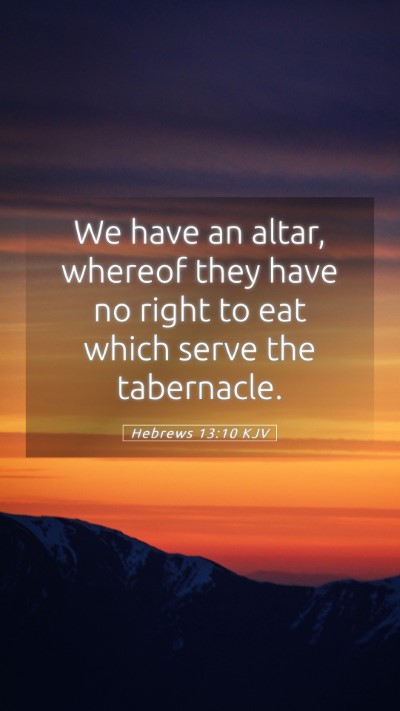Meaning and Interpretation of Hebrews 13:10
Hebrews 13:10 states: "We have an altar, whereof they have no right to eat which serve the tabernacle." This verse serves as a significant point in the author's exhortation, drawing a contrast between the old covenant and the new covenant established through Christ.
Overview of Biblical Context
This passage comes from the closing chapter of Hebrews, a letter directed primarily towards Jewish Christians. The context is crucial as the author emphasizes the superiority of Christ's sacrifice in comparison to the sacrificial system of the Old Testament.
Insights from Public Domain Commentaries
- Matthew Henry: Henry emphasizes that the "altar" referred to in this verse symbolizes the sacrifice of Christ, which believers are invited to partake in. He contrasts the privileges of Christians with the restrictions placed upon the Levitical priests, underscoring that those who adhere to the old covenant are excluded from the true spiritual nourishment found in Christ.
- Albert Barnes: Barnes highlights the exclusivity of the altar referenced. He points out that the Jewish leaders, who serve at the tabernacle, do not have access to the spiritual sustenance that comes from Christ's sacrifice. This emphasizes a shift from the physical to the spiritual, showcasing the completion and fulfillment of the law in Christ.
- Adam Clarke: Clarke focuses on the implications for believers. He explains that the “altar” serves as a metaphor for Christ himself. Those who continue to adhere to the old sacrificial system are missing out on the blessings of the new covenant. Clarke also notes the dangers of reverting back to the practices of the Law after having experienced the grace of Christ.
Theological Significance
The theological implications of Hebrews 13:10 are profound. This verse serves as a reminder of the grace and access believers have through Christ, symbolizing a new altar that is not limited by the Levitical system.
1. The New Covenant's Superiority
Hebrews consistently argues for the supremacy of the new covenant. This verse encapsulates the idea that through Christ's sacrifice, believers have access to spiritual life and nourishment that the old covenant could not provide.
2. Christ as Our Spiritual Nourishment
The "altar" in this verse conveys that Christ himself is the sustenance believers need. Participating in the new covenant means embracing the faith and grace found in Jesus, rather than relying on the old sacrificial system.
Cross References
- Romans 10:4: "For Christ is the end of the law for righteousness to everyone who believes." This passage reinforces the notion that Christ fulfills the law.
- Colossians 2:16-17: These verses elucidate the concept of the shadow of the old covenant pointing to the reality found in Christ.
- 1 Peter 2:5: "You also, like living stones, are being built into a spiritual house..." This verse emphasizes the body of Christ as the new temple and community of faith.
Application for Believers
For modern-day Christians, Hebrews 13:10 is a call to understand and embrace the implications of the new covenant. Here are some ways to apply this understanding:
- Embrace Spiritual Growth: Recognize the importance of spiritual nourishment that comes from engaging with the teachings of Christ.
- Avoid Legalism: Be mindful of tendencies to revert to old practices and laws that can undermine the grace provided through Jesus.
- Participate in Communion: See the Lord’s Supper as a reminder of the altar we partake in that connects us with Christ’s sacrifice.
Conclusion
In understanding Hebrews 13:10, we gain insight into the deep theological truths that underscore the transition from the old to the new covenant. Using resources such as commentaries, Bible study guides, and group discussions can enhance our understanding and application of scripture. Engage in online Bible study and utilize various Bible study tools to further explore these meanings.


